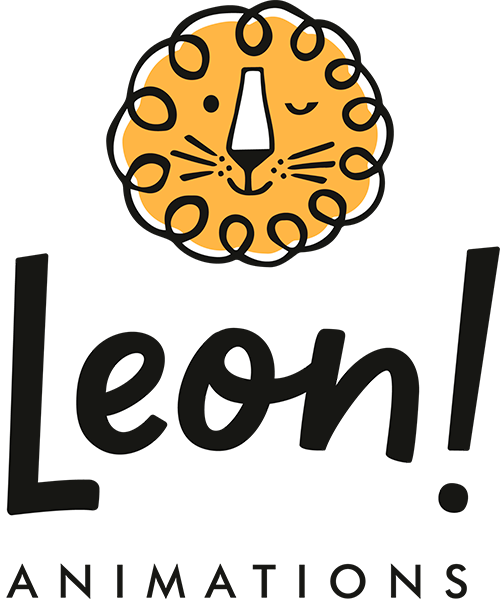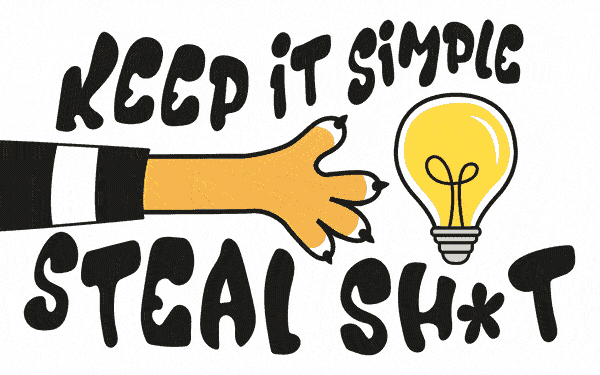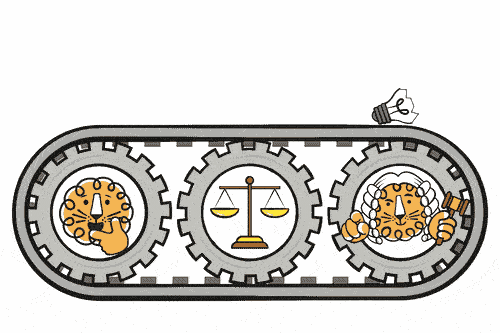Keep it Simple, Steal Sh*t - Leon! Animation Studio
You should be stealing work from your peers and competition… Yes, that includes their 2D explainer animations.
Bold opening? Yes. Risqué? A bit. True and worth exploring? Definitely.
Creativity is an interesting phenomenon because scientists don't know much about it. To be fair, they've figured out that as a brain activity, creativity likely comes from the work of the three major networks in the brain working together.
One generates ideas, one evaluates the ideas, and the final one decides which of the "brilliant" ideas you've just come up with is "good":
So, What Does Creativity Have to do with Stealing?
There seems to be a vital genetic component to creativity, which makes sense if you consider that most people aren't highly creative. So if you're working in a creative field and always struggling, you can blame your parents or the genetic lottery.
(I've definitely got a bone to pick with my dad.)
There is a legitimate way to boost your creativity, though: experience. Studies have shown that exposure to new ideas is one of the primary ways to increase your creativity.
The more ideas you're exposed to, the faster the idea-generating network in your brain will come up with something that can be useful for your situation. This process worked incredibly well for us at Leon! Animations when we were first starting.
The Centre for Policy Studies had tasked us with creating an animation that explained why countries that spent a smaller % of GDP on public services sometimes had better public service results than "Big Government" countries.
Here's a clip from the result: SMALL IS BEST (full video here):
And here's where we "stole" the retro/vintage motion graphics template from:
The video looks a bit old now, but it was pretty revolutionary in the think tank world ten years ago.
If we had started this project entirely from scratch, we would have had a lot of work on our hands. Instead, we spent $50 to access someone else's template and saved a ton of time.
Programmers and software developers take a similar approach all the time. When encountering a novel issue, one of the first things they do is visit a website like Stackoverflow.com. In a nutshell, Stack Overflow is a library of questions, answers and source code that developers can "steal" for free to use as a basis for solving their problems.
The point is that developers can accumulate some reference material, AKA "experience", in almost no time, boosting their ability to be creative.
You don't have to be a programmer or designer to apply this strategy. You can solve almost any problem with a bit of "theft".
Be Careful How You Go About This
Of course, we don't literally mean to steal the work of other artists and claim it as your own or even use it without reference. No, no, no- that's an immoral and generally illegal course of action.
However, the more ideas you can approach in your journey to a solution, the more reference data you'll build-up, and the creative ideas will start to flow.
We often buy stock graphics from online marketplaces like Envato, Freepik and Shutterstock in our creative process. Plus, we're always looking through Behance, Pinterest and Vimeo for inspirational concepts from other design studios and artists.
We've made "stealing" artwork from other artists an integral part of our creative process. It saves a TON of time.
Of course, you need to be careful about how you approach this. Don't be this coffee shop:
At LEAST airbrush the Shutterstock logo out…
I'm kidding, of course. NEVER EVER steal something outright.
But if you're stumped for ideas, purchase the stock image and expand on it. Put your creative twist on things rather than blatantly plagiarising your next big project.
Here's an example worth thinking about:
A pretty famous photo was going around the internet of a young Afghan boy named Murtaza, playing football whilst wearing a blue and white striped shopping bag. Murtaza is a perfect example of stealing to simplify. He was inspired to follow in the footsteps of his favourite footballer and "stole" his uniform.
Due to copyright issues, we can't post the exact image, so we'll replace it with this image of our lion wearing Murtaza's shopping bag:
Can you guess who his favourite footballer is?
If you guessed Messi, you guessed right.
This little boy "stole" the design for the Argentinian national team and fulfilled his desire to emulate his favourite footballer. Think like Murtaza. He didn't pirate an entire jersey design. He captured the essence of Argentina's shirt and emulated it in his own way.
Even Stealing Can Take Time
Stealing cuts down a lot of the time it takes for you to find the proper framework or inspiration for your next big project. But it can still take some time to find the exact right one. If you're a little short on time, try coming up with a combination of ideas to use as inspiration rather than one that fits the situation perfectly.
But if you're looking for inspiration for something that will be powerful, simple, in touch with your target audience, and have a long-lasting impact, you'll have to invest time into finding it.
Not interested in the grind?
Why not let us handle the extra work for you?
We're pretty effective at research, and we've created some compelling 2D explainer animations for some well-known entities at this point: the UN (yeah- THAT UN), the Royal Society (the world's oldest scientific academy), John Laing (pretty massive construction company), the NHS (the UK's public health service) and King's College London (a group of people with GIANT brains).
So we know a thing or two about effective design.
If you're interested in having us help you out, click on the image below to book a quick meeting with us.
Discover all 10 of our Simplification Commandments: 1) What's the 1st Step?, 2) Knowledge = Powah!, 3) Explain to Toddlers, 4) eXpEriMenT!, 5) Devil's Advocate, 6) Steal Sh*t!, 7) Take a Brake!, 8) Change Goals, 9) Give Up!, and 10) Ask for Help.
Our animation studio services for charities and healthcare organisations use these same principles to transform complexity into crystal-clear explainer videos.










